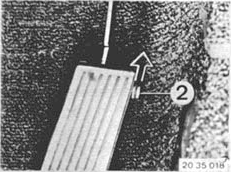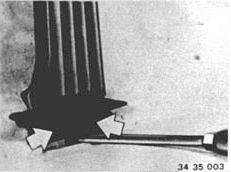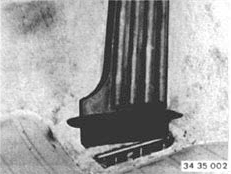Pedals
The pedals are the foot-operated controls for the E30. Automatics have two, while manual cars have three. If you don't know this sort of stuff, please cut up your driving licence and put it in the bin.
Contents
Accelerator Pedal
The accelerator pedal, also known as the loud pedal, happy pedal or (disturbingly) the gas, is how you make your car speed up. When you press it, it does not increase the amount of fuel going in to the engine. Instead it pulls a cable which opens a flap on the throttle body, allowing more air into the intake. The ECU detects this increased air flow via the AFM, and injects more fuel accordingly.
The accelerator pedal is the same on all cars.
Removing the Accelerator Pedal
The accelerator pedal is clipped to the floor of the car, which makes things awkward if you're trying to remove the carpet. Here's how to get it out without breaking much.
Brake Pedal
The brake pedal is part of the pedal box, which also holds the clutch pedal. The brake pedal arm connects to a brass rod, which then connects to the brake servo.
The brake pedal also houses the switch for the brake lights.
Clutch Pedal
The clutch pedal is part of the pedal box, which also holds the brake pedal. The clutch pedal arm bolts directly to the clutch master cylinder, which supplies the hydraulic pressure to work the clutch.
On automatics that don't have this pedal, the hole for the master cylinder is covered with a metal blank. This should easily pop out with a swift tap of the hammer if needed.
Replacing Pedal Box
This is mostly done as part of an auto-to-manual swap. Here's how to get your old box out, and the proper two-pedal box in.
Removing Automatic Pedal Box
This is a fiddly job not helped by the fact your working in a footwell. Be careful when removing the brass rod connecting the brake pedal to the brake servo. Make sure you remove it at the pedal end, but not at the end behind the glovebox or you will have the biggest of jobs to reattach it. This is quite difficult to achieve as the threads on this brass rod run in opposite directions so as you loosen it at the pedal end, it loosens at the servo end and vice versa. If possible, try to spin the pedal box once removed from the bulkhead rather than the other way round. It may seem like doing it the wrong way round, but trust me, you will save yourself work in the long run. If you get this wrong, it's a two-man job to reattach it.
Make Hole for Clutch
Look at the firewall and you will see an area which is already marked out for the clutch master to go through. This is an especially thin piece of metal which should just pop out. Using something like an old breaker bar or summat and apply some gentle persuasion with a hammer, this will pop the punch out and this is where the master cylinder goes through.
Fit Pedal Box
Refit the manual pedal box, reattaching the brass rod to the brake pedal. Do not bother raising the brake pedal too high at this moment as you will want to see where the accelerator and the clutch pedal will sit and raise it to about the same height. Bolt the clutch master cylinder to the clutch pedal at the same time.


